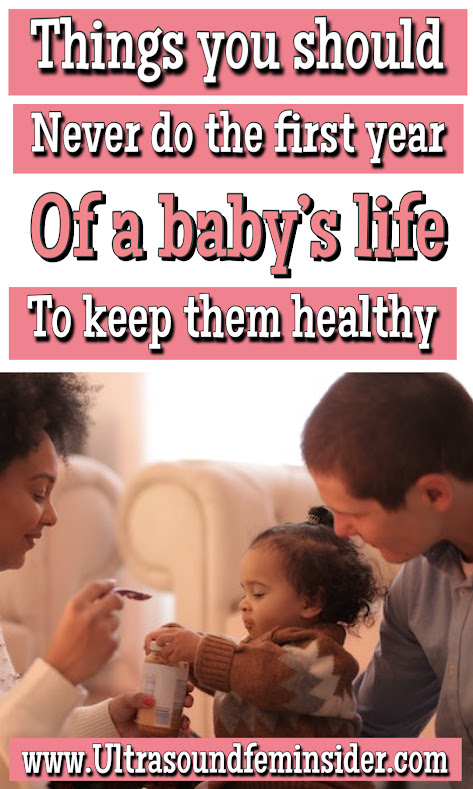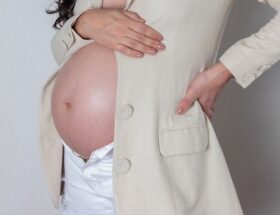Starting a family is definitely one of the most stressful yet most rewarding tasks any woman can go through. When you decide to have a family, especially if it is the first time, there are so many things that we can do wrong without knowing that they can put our baby in danger. For that reason, in this article, I have made a compilation of the most Dangerous Things to Avoid During the First Year of Your Baby’s Life because they can harm your baby in one way or another. Ready? Let’s begin.
Dangerous Things to Avoid During the First Year of Your Baby’s Life. Feeding Category.
Giving your baby food that has been sweetened with unnatural or refined sugar.
Sugar that has been refined should not be given to infants to consume, especially during the first year of life. The baby’s need for sugar may be satisfied by eating foods that are high in carbs as well as other foods that are naturally sweet, such as fruits. If you give your infant more sugar throughout his first year of life, you run the risk of him developing major health issues such as dental decay, obesity, diabetes, and lethargy.
Including salt in the food that your baby eats.
Until they are at least six months old, newborns should not be fed any salt whatsoever, as recommended by a number of health organizations and physicians. The salt that is found in mother’s milk satisfies their need for sodium.
The maximum amount of salt that should be provided to infants whose ages range from six months to one year is one gram per day. One gram of salt is equal to 0.4 grams of sodium. If you give your infant more salt during his first year of life, you run the risk of him developing major health issues such as kidney stones, high blood pressure, the risk of being dehydrated, or developing bones problems.
A baby during the first year of life cannot eat Honey.
It is not suggested that you give your infant honey before the age of one year. It is possible for it to result in baby botulism, which is potentially lethal condition. The potentially lethal sickness known as infant botulism is brought on by the ingestion of certain bacteria that, once inside the body, create harmful toxins. Before the age of one year, a baby’s digestive system is still not fully matured, and as a result, it is unable to digest properly some types of bacteria. Honey is a recognized source that includes spores of a bacterium called Clostridium botulinum, this bacteria can cause a rare but potentially fatal sickness in infants.
Do not give your baby soy milk during the first year of life.
It is not recommended that infants less than one year of age consume soy milk. Children cannot get the proper nutrients from soy milk, which is detrimental to their development as a whole. If you give your child soy milk, they will develop severe vitamin and mineral deficiencies, as well as fatty acid deficits, which can be fatal. If a physician believes that a newborn should avoid cow’s milk protein or lactose, or if the child simply is unable to accept milk-based formula, then the physician will offer soy formula instead. In all other respects, the formula that is made with milk is preferable than the one that is made with soy milk.
Avoid giving your baby cow’s milk within the first year of life.
According to the recommendations of the American Academy of Pediatrics, you should not give your baby cow’s milk if they have not yet reached the age of one year. The reason for this is that cow’s milk does not contain sufficient levels of vitamin E, iron, or vital fatty acids in its composition. One further reason is that your child’s digestive system isn’t developed enough to deal with the high quantities of protein, salt, and potassium that are found in cow’s milk.
Avoid giving your baby fruit juices with added sugar and artificial colorants.
According to the recommendations of the American Academy of Pediatrics. Infants who have not yet reached their first birthday should not consume any fruit juices. This is due to the fact that juice does not provide any nutritional advantages in the early stages of a child’s life, and it has the potential to replace what infants truly require, such as breast or formula milk. Along with the milk’s protein, fat, minerals, and calcium. The use of juices is not recommended as a healthy option since they cannot adequately replace the nutritional value of fresh fruits and instead add additional calories and sugar to the diet.
Feeding your infant packaged or processed foods on the regular basis.
One of the unhealthiest types of food for infants to consume is food that has been processed. Foods that are already prepared and are intended for consumption by older children or adults should not be given to infants under any circumstances. They frequently include excessive amounts of sugar, salt, and fat, in addition to relatively few nutrients. You should not give your infant deli meats since they are frequently rich in salt and can put them at risk for food poisoning. Instead, you should give your infant minced beef or roast chicken cut into little pieces.
Feeding your infant food that might cause them to suffocate.
Any age child is at danger of choking on food, but children under the age of three and especially those under one year old who have only recently begun learning how to eat are at the greatest risk. The most current statistics available from the CDC show that 463 people passed away as a result of choking on food.
When you are preparing meals for your baby, it is best to keep in mind a list of things that you should not do in order to protect the lives of your baby and avoid shocking. Among the foods that your baby should not be eating within the first year of life to avoid shocking are:
- Toasted popcorn.
- Candy (especially hard candies or chewy ones)
- Carrots.
- Hot dogs.
- Chewing gum.
- Peanuts and other types of nuts.
- Plum tomatoes in their shells.
- Chicken that still has its bones.
- Fruit cut into large bits, like pineapple and apples, for example. Or fruits with seeds such as Pomegranate.
Feeding your infant grapes that are still with the skin.
Grapes are a healthy snack for children, but they shouldn’t be given to infants until they are much older. The peel is difficult to entirely break down, and the stiffness and size of the fruit make them a significant choking hazard for anyone who consumes them. If you wish to give your child grapes, it is recommended that you blend them with bananas, apples, or pears first before serving them.
Avoid giving your baby coffee or tea, especially during the first year of life.
Various people offer their infants coffee or tea as a treatment for gastrointestinal issues such as constipation or diarrhea because this is a widespread practice in some cultures. Your child may experience dehydration as a result of caffeine, which is included in beverages such as coffee and tea. In addition to this, even minute levels of caffeine can quicken the rate at which your baby’s heart beats, which may result in palpitations or even a severe headache.
Share this post!

Dangerous Things to Avoid Doing During the First Year of Your Baby’s Life. Other things that can put a baby in danger.
Microwaving the milk bottle in order to warm it up.
It is not suggested to heat breast milk or baby formula in a microwave oven. It can cause hot spots, which can burn your child’s lips, and cooking meat and dairy in a microwave can disrupt the molecular structure of food. Both of these things can happen when you use a microwave (creating carcinogens). The best way to heat breast milk is to put the bottle in a bowl of hot water that’s been contained in a metal bowl. This process takes approximately ten minutes, but it’s well worth it to ensure that your child stays healthy.
Feeding your baby while they are laying down.
Although this is the position that most nursing mothers choose for their babies, it is recommended that you place your child in a posture in which his head is elevated above his body rather than on the same level. This is due to the fact that there is a greater likelihood of infant getting gas when being fed in the sleeping posture. Another issue that may arise as a result of the infant being in this position is the potential for milk to go into the baby’s nose, eyes, and ears, which might result in shocking. Therefore, in order to prevent these problems, please be aware that the ideal way to feed a baby is to position the infant on your laps.
Avoid exposing your baby to secondhand smoke.
If one of the parents smokes and then cuddles the baby while the smell of smoking is still on his mouth, hands, and clothing, then the newborn is at danger of developing serious health issues or perhaps sudden infant death syndrome (SIDS). Babies who are exposed to the chemicals in cigarette smoke are more likely to develop asthma, chest and ear infections, and lung cancer. Therefore, in order to protect the health of your child, your spouse (or you) should take a shower and change their clothes after each and every cigarette that they smoke before they may hold the baby, mainly during that first year of life.
Stop using fragrances containing toxic substances near your baby.
In particular during the first year of life, it is extremely advised that all soaps be as unscented and dye-free as is humanly feasible. Their sensitive skin might be irritated by chemical odors, and some of the scents are overpowering to them.
Many fragrances and lotions are formulated with petroleum products and other chemicals, allergens to which a large number of individuals are hypersensitive. Furthermore, these ingredients can be hazardous to human health, particularly that of young children. Therefore, if you want to keep your baby healthy, using essential oils is a preferable option to artificial smells because they are safer.
Be aware of your baby’s body temperature, refrain to use excessive coverage.
According to the American Academy of Pediatrics, the risk of sudden infant death syndrome (SIDS) is increased when a newborn is covered with an excessive amount of warm clothes and an excessive number of blankets. You presumably already know that you should keep stuffed billows and blankets away from your sleeping baby and that you should put him to sleep on his back. Also, you probably already know that you should put your baby to sleep on his back. But how can you tell if your child’s temperature is dangerously high? The answer is that you can determine how warm he is by feeling his stomach or chest while he is wrapped in the blanket.
Don’t allow your infant to play with items that are to small.
Young children under the age of three will naturally investigate new objects by placing them in their mouths. Because their coughing reflexes have not fully matured, it is simple for foreign objects to become caught in their throats, causing them to either choke or suffocate. Warning labels may be seen on the majority of modern toys, stating that children less than 3 years old should not play with them since they contain tiny components.
But what about other goods found around the house that don’t have labels? Is it possible to determine whether or not they pose a choking risk? The answer is that there is a piece of equipment known as the tiny parts test fixture that is used to measure the various components of the toy. It is a tube in the shape of a cylinder with a diameter of 1.25 inches and a depth of between 1 and 2.25 inches.
Its mouth and pharynx are modeled after those of a youngster for realism’s sake. Any item that may be contained within the tube is regarded as a tiny portion, and thus poses a risk of choking for infants. Children have a greater risk of choking on non-food items, such as pins, batteries, clothing buttons, balloons, and balls with a diameter of less than 1.75 inches. This risk is in addition to the risk of choking on food.
Other posts you might like to read after.
5 essential tips to take care of a newborn baby.
First three months newborn developmental milestones.
Final thoughts about Dangerous Things to Avoid During the First Year of Your Baby’s Life.
During the first year of your baby’s life these things mentioned in this article can put your baby’s life in danger. That is why it is always important to inform us of the things that our babies can or cannot do so as not to regret the consequences. If by any chance you do or are doing any of these things mentioned above, do not judge yourself, just stop doing it immediately for the health and well-being of your baby, which at the end of everything is paramount. Thank you for reading this article, I’ll see you in my next one.
Zadi, xo









